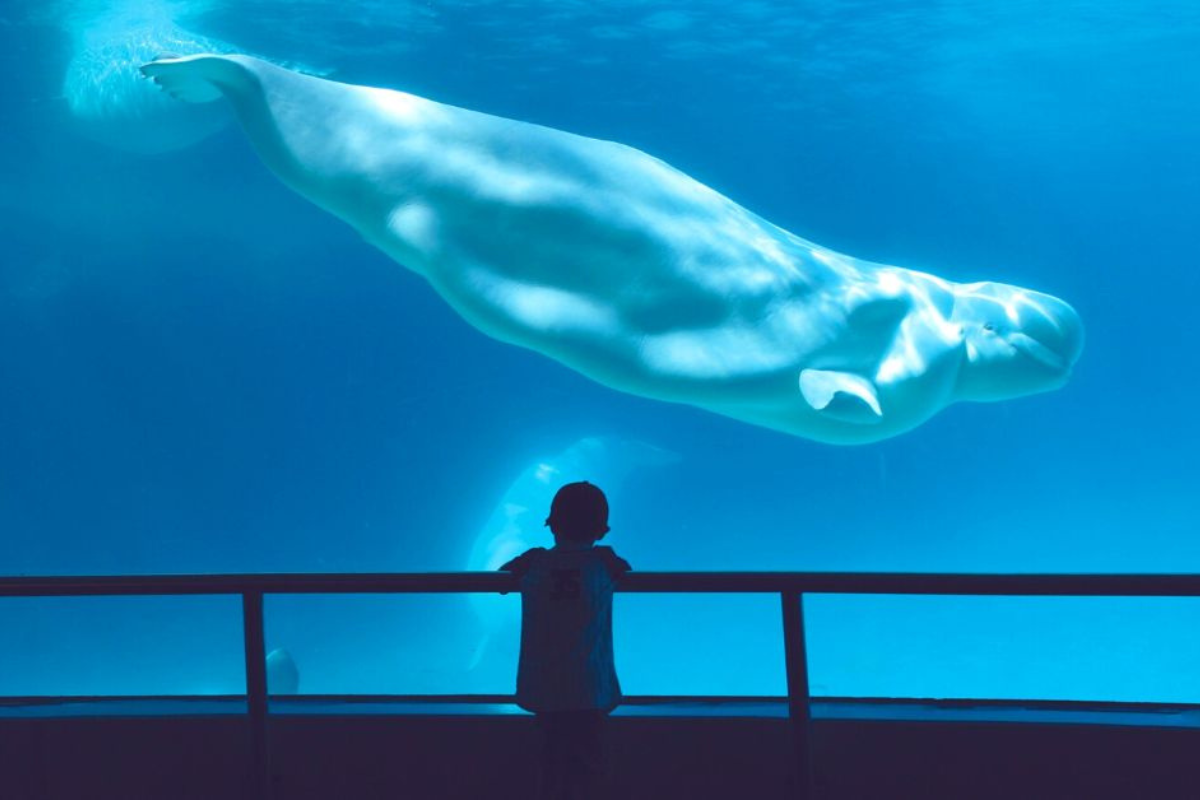By Scott Smith
The facts are as incontrovertible as they were foreseeably tragic: In May 2021, over the legal protestations of Friends of Animals and other animal-rights groups and with the blessing of two federal agencies and one compliant judge, Mystic Aquarium transported five beluga whales from Marineland in Canada to its entertainment park in Connecticut.
Within three months, one beluga was dead. A second beluga would soon succumb, with a third whale critically ill from unspecified causes. Mystic Aquarium claimed the belugas were brought in for research purposes, though it didn’t stop the tourist attraction from collecting millions of dollars off fundraising efforts focused on crass naming opportunities for the whales and gate receipts from visitors viewing the captive whales in their small enclosures.
A scathing U.S. Department of Agriculture report made public in April 2022 revealed six-year-old beluga Havok’s last eight hours before his death on Aug. 6, 2021 were full of extreme discomfort and distress. However, no one told an attending veterinarian until after he died. Another transferred whale, a female named Havana, died in February 2022.
The aquarium defended its care of the animals, citing a pathology report that indicated both whales died due to diseases that could not have been prevented.
Little more is known about the two whales’ deaths, the treatment they received or the status of the three other belugas, which is why on March 30, 2023, attorneys from Friends of Animals Wildlife Law Program filed a complaint in federal court against the National Marine Fisheries Service (NMFS) and the Animal and Plant Health Inspection Service (APHIS). The lawsuit seeks to hold NMFS and APHIS accountable for redacting and withholding information from FoA’s Freedom of Information Act requests seeking to shed light on the deaths of beluga whales at Mystic Aquarium and the health status of the surviving captive belugas.
“Friends of Animals filed two FOIA requests after the death of the second beluga whale at Mystic, one to NMFS and one to APHIS,” said Stephen Hernick, an attorney with FoA’s Wildlife Law Program. “We wanted to have a better understanding of how this happened and what the government was doing about it. Mystic was controlling the information available to the public, and the agencies were not issuing any independent accounts about the deaths or the health of the whales. NMFS has simply made public Mystic’s account of what happened.”
Both federal agencies withheld documents responsive to FoA’s FOIA requests on the purported basis that they are protected by FOIA exemptions. Neither agency sufficiently described the documents they were withholding or explained why the exemptions apply, as they are obligated to do under FOIA. Friends of Animals appealed both agencies’ responses. APHIS almost entirely denied the appeal, and NMFS never responded.
“This lawsuit is about holding these agencies accountable. They combined to make a disastrous decision with predictable consequences by allowing the import of these belugas,” Hernick adds. “By withholding these documents under dubious rationales, the agencies are seeking to keep the health of the belugas shrouded in secrecy and to obscure their inactions that brought about these deaths. The public has a right to learn more about the health of belugas whose import NMFS and APHIS greenlit.”
Controversial decision, disastrous results
Belugas, which can grow up to 18 feet, inhabit the Arctic and subarctic regions of Russia, Greenland, and North America and navigate in shallow river mouths and estuaries during summer. But during other seasons, they are found in deeper waters, diving to 1,000-meter depths for periods of up to 25 minutes. The deepest recorded dive was 3,300 feet.
In December 2022, Friends of Animals submitted a rulemaking petition to NMFS to prohibit the import, export, breeding and public display of captive cetaceans in the United States. FoA’s legal petition examines the extreme negative impacts that the capture, import, export and display of cetaceans imposes on their health, safety and well-being. Captivity also robs cetaceans of the dynamic, complex and expansive habitat and relationships they would have in the wild. Cetaceans are often migratory, traveling 35 to 140 miles a day.
Mystic’s 750,000-gallon habitat is a combination of three different tanks–a main pool just 16.5 feet deep that’s connected to the holding pool and medical pool by a series of sliding gates. The gates are not always open, so whales do not always have access to the three different tanks. Since the death of the first beluga, NMFS has halted all research on the remaining captive whales. But those whales are still on display to the aquarium’s paying customers.
“When the federal government makes controversial decisions that have disastrous results, oversight and accountability are important to ensure they do not make the same bad decisions again,” said Jennifer Best, director of Friends of Animals Wildlife Law Program. “We hope the information we are seeking from the FOIA requests can shed light on what happened and advance our efforts to change the laws and to prevent the trade of belugas under the false pretense of ‘research’ in the future.”

